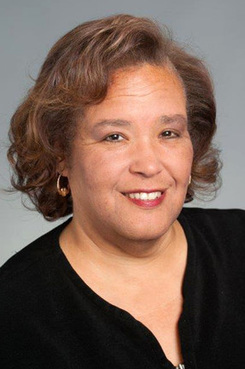Secretary of State Agrees to Not Enforce Law Limiting Interpreters at the Polls
Georgia's acting secretary of state settled the federal lawsuit less than 24 hours after it was filed.
November 29, 2018 at 12:53 PM
3 minute read
 Robyn Crittenden, acting secretary of state for Georgia (Courtesy photo)
Robyn Crittenden, acting secretary of state for Georgia (Courtesy photo)Georgia's secretary of state has settled less than 24 hours after a civil rights group challenged a state law limiting the use of interpreters at the polls.
Secretary of State Robyn Crittenden agreed the state law will not be enforced for the Dec. 4 runoff, an upcoming March 19 special election or any subsequent election, said James Woo, a spokesman for Asian Americans Advancing Justice in Atlanta. AAAJ filed suit Wednesday, asking a federal judge for a temporary restraining order to bar enforcement of the state law.
“Both parties were able to negotiate a satisfactory resolution to this litigation,” Crittenden spokeswoman Candice Broce said Thursday. The secretary of state will provide immediate guidance to all county election and registration officials “to explain the parameters of the agreement,” she added.
“This law should have never been passed in the first place, but we are very pleased that the secretary of state was willing to work with us to swiftly end it,” said Phi Nguyen, litigation director at AAAJ's Atlanta chapter. She called it a victory for all voters with limited proficiency in English who “will now have the right in every election to bring an interpreter of their choice.”
The national Voting Rights Act allows voters with limited proficiency in English or who can't read or write to have their choice of an interpreter or assistant as long as the helper is not a representative of a voter's employer or a union to which they may belong.
Georgia has a far more restrictive law that limits interpreters to those who are registered to vote in the same precinct as the person needing help or who are members of a voter's immediate family. It also limits interpreters to assisting no more than 10 people at the polls.
Georgia's law shouldn't supersede the federal voting law as long as a federal candidate is on the ballot. But there are no federal races in the runoff. In addition, AAAJ documented problems at some polls on Nov. 6 where poll workers attempted to enforce the state law and bar would-be voters from relying on interpreters who met the federal but not the state standards.
This content has been archived. It is available through our partners, LexisNexis® and Bloomberg Law.
To view this content, please continue to their sites.
Not a Lexis Subscriber?
Subscribe Now
Not a Bloomberg Law Subscriber?
Subscribe Now
NOT FOR REPRINT
© 2025 ALM Global, LLC, All Rights Reserved. Request academic re-use from www.copyright.com. All other uses, submit a request to [email protected]. For more information visit Asset & Logo Licensing.
You Might Like
View All
12-Partner Team 'Surprises' Atlanta Firm’s Leaders With Exit to Launch New Reed Smith Office
4 minute read
After Breakaway From FisherBroyles, Pierson Ferdinand Bills $75M in First Year
5 minute read
On the Move: Freeman Mathis & Gary Adds Florida Partners, Employment Pro Joins Jackson Lewis
6 minute read
Veteran Litigators Move From Sidley Austin to Alston & Bird's New Chicago Office
3 minute readTrending Stories
- 1'A Death Sentence for TikTok'?: Litigators and Experts Weigh Impact of Potential Ban on Creators and Data Privacy
- 2Bribery Case Against Former Lt. Gov. Brian Benjamin Is Dropped
- 3‘Extremely Disturbing’: AI Firms Face Class Action by ‘Taskers’ Exposed to Traumatic Content
- 4State Appeals Court Revives BraunHagey Lawsuit Alleging $4.2M Unlawful Wire to China
- 5Invoking Trump, AG Bonta Reminds Lawyers of Duties to Noncitizens in Plea Dealing
Who Got The Work
J. Brugh Lower of Gibbons has entered an appearance for industrial equipment supplier Devco Corporation in a pending trademark infringement lawsuit. The suit, accusing the defendant of selling knock-off Graco products, was filed Dec. 18 in New Jersey District Court by Rivkin Radler on behalf of Graco Inc. and Graco Minnesota. The case, assigned to U.S. District Judge Zahid N. Quraishi, is 3:24-cv-11294, Graco Inc. et al v. Devco Corporation.
Who Got The Work
Rebecca Maller-Stein and Kent A. Yalowitz of Arnold & Porter Kaye Scholer have entered their appearances for Hanaco Venture Capital and its executives, Lior Prosor and David Frankel, in a pending securities lawsuit. The action, filed on Dec. 24 in New York Southern District Court by Zell, Aron & Co. on behalf of Goldeneye Advisors, accuses the defendants of negligently and fraudulently managing the plaintiff's $1 million investment. The case, assigned to U.S. District Judge Vernon S. Broderick, is 1:24-cv-09918, Goldeneye Advisors, LLC v. Hanaco Venture Capital, Ltd. et al.
Who Got The Work
Attorneys from A&O Shearman has stepped in as defense counsel for Toronto-Dominion Bank and other defendants in a pending securities class action. The suit, filed Dec. 11 in New York Southern District Court by Bleichmar Fonti & Auld, accuses the defendants of concealing the bank's 'pervasive' deficiencies in regards to its compliance with the Bank Secrecy Act and the quality of its anti-money laundering controls. The case, assigned to U.S. District Judge Arun Subramanian, is 1:24-cv-09445, Gonzalez v. The Toronto-Dominion Bank et al.
Who Got The Work
Crown Castle International, a Pennsylvania company providing shared communications infrastructure, has turned to Luke D. Wolf of Gordon Rees Scully Mansukhani to fend off a pending breach-of-contract lawsuit. The court action, filed Nov. 25 in Michigan Eastern District Court by Hooper Hathaway PC on behalf of The Town Residences LLC, accuses Crown Castle of failing to transfer approximately $30,000 in utility payments from T-Mobile in breach of a roof-top lease and assignment agreement. The case, assigned to U.S. District Judge Susan K. Declercq, is 2:24-cv-13131, The Town Residences LLC v. T-Mobile US, Inc. et al.
Who Got The Work
Wilfred P. Coronato and Daniel M. Schwartz of McCarter & English have stepped in as defense counsel to Electrolux Home Products Inc. in a pending product liability lawsuit. The court action, filed Nov. 26 in New York Eastern District Court by Poulos Lopiccolo PC and Nagel Rice LLP on behalf of David Stern, alleges that the defendant's refrigerators’ drawers and shelving repeatedly break and fall apart within months after purchase. The case, assigned to U.S. District Judge Joan M. Azrack, is 2:24-cv-08204, Stern v. Electrolux Home Products, Inc.
Featured Firms
Law Offices of Gary Martin Hays & Associates, P.C.
(470) 294-1674
Law Offices of Mark E. Salomone
(857) 444-6468
Smith & Hassler
(713) 739-1250






